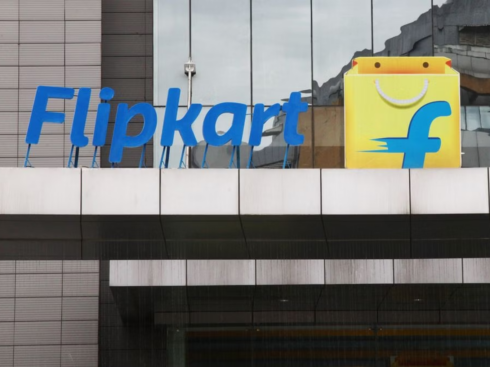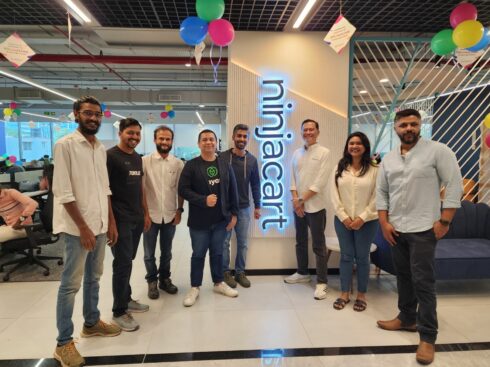The business of HR is to know the business.
Today, digital innovation influences every aspect of our workplace, and more recently, many tech startups are setting their sights on the advancement of human resources. Every company in the world, big or small, requires HR services.
The world today is observing rising attrition rates, and a growing trend of increased movement from one job to the next. It therefore becomes imperative for companies to adopt technologies and systems that will integrate solutions for organisational challenges, better engage their employees, and improve business outcomes. The relationship that HR has with tech is important because they help each other reach the middle-ground between proactivity and reactivity.
With this in mind, Rohit Chennamaneni, Jayant Prasad Paleti, and Chaitanya Peddi – the team behind Darwinbox, started their journey to address many of the biggest frustrations and challenges in HR today.
A Step Towards HR Evolution
Three years ago, in November 2014, while working for a corporate consulting firm, Jayant realised that the companies he was advising for takeover had absolutely no idea regarding the HR functions of the company they were merging with. In addition to that, the founders had no idea about attrition in their own company and believed that it was less than what was not the case.
 These issues was heightened by the fact that the company was using three different HR software which made data capture even more difficult, recollects Rohit. That’s when Jayant called his friends Rohit and Chaitanya to discuss whether they could build a platform which can make the HR department intelligent and strategic rather than a tactical function. They tried to create a unified solution into their product that included payroll, hiring, candidate sourcing, referral management, employee management with easy documents, and analytics.
These issues was heightened by the fact that the company was using three different HR software which made data capture even more difficult, recollects Rohit. That’s when Jayant called his friends Rohit and Chaitanya to discuss whether they could build a platform which can make the HR department intelligent and strategic rather than a tactical function. They tried to create a unified solution into their product that included payroll, hiring, candidate sourcing, referral management, employee management with easy documents, and analytics.
Says Rohit, “While we were based out of Hyderabad, we also studied the HRtech market in India by looking at various available products that focussed on one or two key specifics of the HR’s job. What was lacking was a comprehensive, integrated product that could provide a one stop solution to all the technical aspects of the HR department. We kept our day jobs from 2015 to Jan 2016 and when the product was ready we quit our jobs and started Darwinbox. The name was a pun relating to the theory of putting evolution inside a box.”
Darwinbox was founded in August 2015 by Rohit Chennamaneni, Jayant Prasad Paleti,and Chaitanya Peddi. Rohit, an IIM Luncknow alum, has worked with McKinsey and Google. While Jayant was an investment banker at Ernst and Young and studied at IIM Lucknow and IIT Madras. Chaitanya also worked with EY HR Consulting and Product Development at Verizon. He is an alumnus of XLRI. Coming from such diverse fields, the trio has tried to build an intelligent HR management product.
In July last year, the startup raised an undisclosed amount of funding in a round led by Endiya Partners. TracxnLabs, Aaruha Technology, and Mohandas Pai through his investment vehicle 3one4 capital, also participated in this round.
How Does It Work : Combining Technology With Intuition
Darwinbox is a new-age cloud HR platform that takes care of all HR needs across the employee life cycle – the six HR modules, which include: recruitment, core transactions (leave, attendance, directory), payroll, employee movement, employee engagement, talent management and people analytics. The UI of Darwinbox offers a one-stop solution for all the technical HR requirements and, what’s more, all of its offerings can be configured as per the company’s needs. Even for a non-tech-savvy user/employee, Darwinbox offers very easy and efficient solutions for everyday tasks and requests.
The dashboard, offers a two-way access to the company: for the employees and administrators. With a single click, employees can apply for leave, request for status updates, and subsequently follow up on instructions assigned to them, in addition to applying for everyday needs such as reimbursements, overtime, salary slips etc. On the admin end, users can update leave cycles, holiday calendars, approve/negate applications, and handle update the employee performance appraisals as well – within a single interface – to ensure a very transparent and objective process in the organisation.
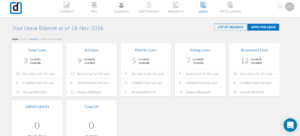
What makes Darwinbox better than its competitors in the market is its intuitive and intelligent capabilities for employee engagement. The dashboard offers an inter-organisational social network called ‘Vibe’ that allows employees to engage with each other and comment anonymously and otherwise, in addition to offering a one-way communication with the HR department. ‘Pulse’ that works along the lines of a moodboard that allows one to review their performance and how their day is going, biometric integration, location-based mobile app etc. The module achieves a truly flat organisational structure by cutting all the layers of hierarchy in communications.
Adds Rohit, “With Darwinbox, we want to engage and empower employees while automating and simplifying all HR processes. Our complete premise is built on ensuring the product is intuitive (higher usage and lesser learning time) and integrated across all facets of HR. Our solution not only caters to operational/tactical workflows in the HR domain, it also helps companies engage their employees over multiple channels.”
The newest addition to the recruitment module is the onboarding module that directly interfaces with the potential candidate through a login and allows the candidate to accept the offer online as well as to submit all the data and documents for verification through the system. This piece of the system eliminates a lot of manual tracking, physical documentation, and even incorporates background verification vendors into the system.
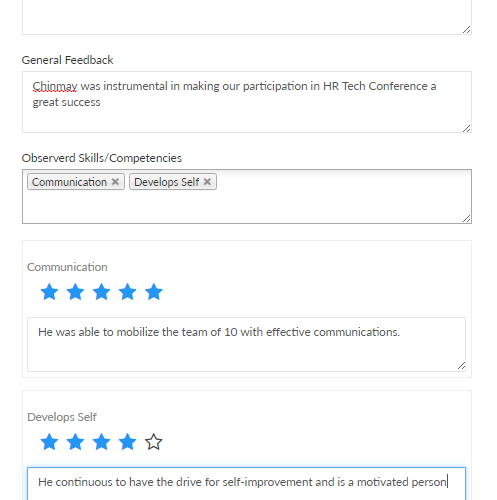
Employees can also check their leave balance, attendance, and request documents such as salary slips, IT declarations, reimbursement forms etc. The software automatically connects the concerned manager and employee, based on the company’s hierarchical order, to facilitate an application. It also offers FAQs for new employees to identify them with company policies in a more interactive and effective manner. The modules have also incorporated engagement principles like goal updates, status trackers, performance journals, sub-goals to bring in continuous performance practices.
The product operates on a SaaS model – which allows companies to only pay as they use. It also deploys machine learning in analytical automation. The solution has been built with an intense focus on mobile, to support employees on the go. The HR platform primarily caters to sector-agnostic medium to large enterprises, with at least 500+ employees and promises flexibility in operations without compromising on the functionality.
More Than 90,000 Employees In Less Than An Year
When asked about the startup’s trajectory since inception, Rohit answers, with a wide smile on his face:“It has been no small feat to attain a client base of 90,000+ employees in less than a year of going live. Especially, in an industry where sales decision in a large company takes about four-six months for closure, this was only possible on the strength of our product, consultative selling, and a strong client referral network.”
The startup fiercely believes that their client conversion rate increases significantly once they have proceeded with the demo. Adds Rohit, “We believe in solving a problem more than selling a product and we intend to build meaningful, long-term relationships with clients to create truly transformational results. This partnership and collaboration-oriented approach is the key to our success.”
Owing to its SaaS model, Darwinbox does not demand any large upfront costs/license fees or the need to invest in a costly IT infrastructure. It charges a subscription fee per employee/per month, and functions via a pay-as-you-go pricing model. They offer flexible pricing based on the number of modules opted and the company size (number of employees).
“Everyone Wants To Be Associated With Paytm These Days, And We Already Are!”
Rohit says that the reason they have managed to retain more than 90K users is because they targeted medium and large enterprises instead of going after the small companies.
By virtue of targeting mid and large enterprises, the company already have 90,000+ employees amongst their client companies using the platform within just 1 year. It claims to have received strong feedback from the market and have marquee clients like Delhivery, Ekart, Sai Life, Swiggy, Voonik, Nivea, Lenskart etc. He adds, “Everything changed for us when we got our first client, Delhivery. It was a big win and promoted our company solely on the basis of word-of-mouth. One of our major wins recently is when Paytm chose Darwinbox as their HR tech solution, after evaluating the who’s-who of the industry.”
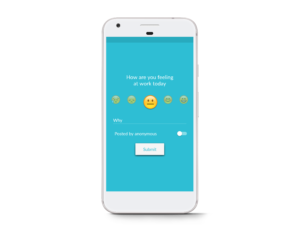 The company began with three founders and now boasts a team of 40. Rohit says, “The team is diversified with talented individuals from all over the country. Everybody’s exceptional performance is what has driven our growth until now and with more coming on board we are able reach out to a much bigger clientele. We had just about the same celebration when a new hire joined and a new client signed up with us. Both were equally significant events in our growth story.”
The company began with three founders and now boasts a team of 40. Rohit says, “The team is diversified with talented individuals from all over the country. Everybody’s exceptional performance is what has driven our growth until now and with more coming on board we are able reach out to a much bigger clientele. We had just about the same celebration when a new hire joined and a new client signed up with us. Both were equally significant events in our growth story.”
Redefining HRTech, The Dark Horse Of Startups
In a market that is dominated either by specialised HR solutions solving individual aspects of HR or by legacy ERP solutions, Darwinbox aims to be a new age end-to-end HR platform. It is functionally-deep, as it caters to all the analytical requirements of the HR dept and addresses issues on top of mind of every HR person with well thought out flows, proprietary intelligence based insights, and intuitive interfaces.
The company went through a series of challenging discussions before finalising its current model because they wanted to offer a combination of process automation tool and productivity automation tool. Says Rohit, “There were difficult decisions to make when we were building the product, especially when it came to choosing functionality versus ease-of-use. We went about meeting 50+ organisations to understand the user experience on systems and a thorough research on the HR processes helped us build the solution we have today.”
When asked about competition from other HRTech solutions available in the market, such as Greyhr, ZingHR, MindTickle, and SumHR, Rohit says what differentiates them from others is primarily their intuitive user experience.
He adds, “The products a working professional uses for personal needs (e.g Uber, Facebook) and business needs at work are at complete dissonance. Enterprise tools lag far behind today’s consumer apps in the quality of technology, usability, and scalability. At Darwinbox, we want to bridge this new “digital divide” and build products that are as effective as your daily use products. Our powerful, new age enterprise HRMS platform is built with a clear focus on intuitiveness and scalability.”
Based out of Hyderabad, the team now aims to hit the 100K+ user base milestone in the near future. It also plans to accelerate marketing and sales efforts to further expand the product across the country as well as to plan our global expansion.
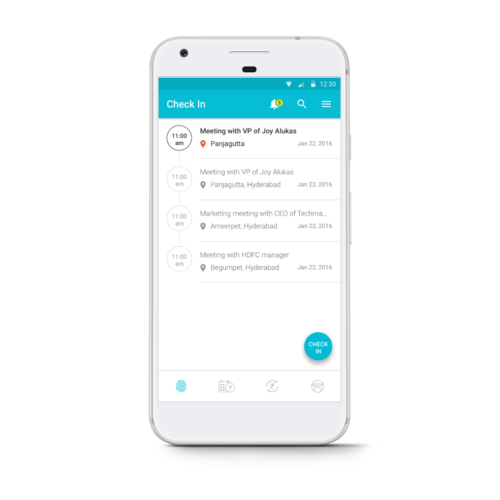
Says Rohit,“Our product roadmap is another critical part of our future plan. Currently, we have six in-depth HR modules that automate and empower HR processes across the employee lifecycle. We obsess to build more strategic modules that will establish and drive the next generation of strategic HR practices in organisations. Our technology will continue to drive adoption of these new age practices with simple and intuitive interface.”
Editor’s Note
The HR-tech segment in India has witnessed a gradual shift since 2012. As per this Inc42 report, With 50 (33 disclosed) deals grossing in $75.52 Mn from 2014 (till November 30, 2016), it can certainly be said the sector is still far from being matured. At the same time, it appears that both buyers and suppliers of HR technology in India have taken several progressive steps reflecting key trends in the global HR technology market. Indian startups are increasingly deploying cloud, big data and analytics and social branding to innovate upon HR technologies.
The basic structural design of companies is also changing in India. Outsourcing HR operations is no longer an option for organisations that aim to drive employee engagement and retention as every single HR process that interfaces with the employee indicates a lot about the employee engagement, retention, and more. With the use of data-backed software, many emerging startups have tried building online platforms that allow for the simplification of the hiring process, increasing visibility, and enabling employers in the matter of finding the right fit for their requirements.
Darwinbox will compete with larger companies likes of Ramco, PeopleStrong and CentraHub. Its enterprise-based offering should offer many benefits of administration and management which on-premise solutions could not offer earlier. It further also has the ability to offer a holistic sphere of human resource capabilities for intelligent HR administration. While there is huge market opportunity for technology companies in market segments and their sub-segments, to what extent Darwinbox will be able to bank upon it remains to be seen.









